Feed Binders Market Research, 2031
The global feed binders market was valued at $1.2 billion in 2021 and is projected to reach $2.4 billion by 2031, growing at a CAGR of 7.1% from 2022 to 2031.
Feed binders are the products that are used to bind, glue, or hold the combination of the various feed components which will help feeds keep their integrity during subsequent processes once they are extruded. Binders are used in animal nutrition to enhance the quality and properties of animal feed and to boost features such as overall gut health/digestive performance, palatability preservation, and others. They have gained significant importance globally as they improve the overall health of animals, which in turn improves the quality and quantity of meat produced. Moreover, they help in improving the feed quality, thus improving the performance and health of animals. The benefits of binders include better disease control and enhanced material handling. Furthermore, they help in keeping the feed as a whole and prevent them from decomposition.
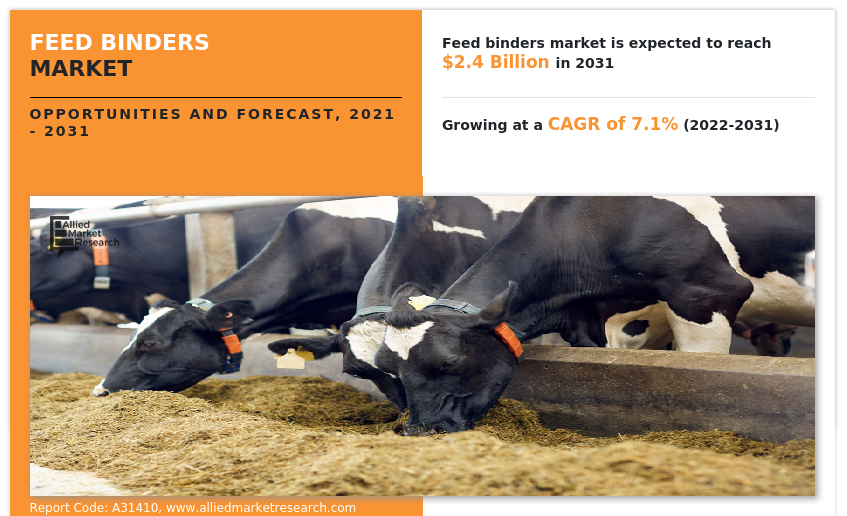
Market Dynamics
An increase in global meat consumption, industrialization of meat products, and a rise in awareness of the quality of dairy & meat products consumed drive the growth of the global feed binders industry. Since there is a huge demand for meat and its products, therefore poultry owners are very careful about the diet of animals as they want animals to grow well and have a nutritious diet. Meat production and consumption have increased rapidly over the years due to the increased disposable income of consumers and the health benefits offered by meat. It has been observed that meat consumption in developing economies is higher than the developed regions. Economic growth, changes in lifestyle, population growth, and other structural changes are driving the livestock revolution, hence supplementing the overall growth of the feed binders market size.
The surge in pet humanization rate also has a great effect on the feed binders market growth since it has become a common practice as the majority of pet owners tend to treat pets like family members. This trend has led to a corresponding increase in the amount of money that people are willing to spend on their pets, as well as the number of products and services available in the market to meet the demands of pet owners. The increase in pet humanization has led to a rise in demand for pet food which includes feed binders in them. Pets are increasingly being seen as members of the family, and as such, pet owners are willing to invest in pets‐™ diets and nutrition. According to American Pet Products Association (APPA), in the year 2021, $123.6 billion was spent on pets out of which $50 billion was spent only on pet food and treats in the U.S. alone. This trend is expected to continue, as the bond between humans and their pets continues to grow which is expected to drive the market growth.
However, a rise in the price of raw materials may hinder the growth of the feed binders market. Since the high price of the binders is expensive for the buyers, therefore they choose binders with high cohesive characteristics to lower the amount of inclusion as well as to limit the cost of feed materials, compound feed mixers, or livestock. Feed products are typically developed and designed with a low overall cost to maintain their market position. Based on the source, extraction method, or likelihood of availability in the area, the cost of raw resources may rise. The prices of raw materials can increase based on the source, extraction process, or the chances of availability in the region.
The rise in popularity of natural solutions for pet food nutrition provides an opportunity for the market to grow since pet owners continue to be extremely sensitive and worried about the nature, reliability, and origin of the components used in the production of pet food. These days, having pets is also becoming more popular. Agriculture and Agri-Food Canada reports that there is a pet population of 27.9 million pets in Canada in 2020. Retail sales of pet food were valued at Can $4.2 Bn in 2020. Dog food was the largest pet food category with retail sales of Can $2.8 billion whereas cat food was valued at Can $1.4 Bn.
Along with this, there is an opportunity for the feed binders market demand to grow since feed binders are in high demand in Asia-Pacific, where they are mostly used in the poultry feed sector. According to the FAO report "World Agriculture: Towards 2030/2050," the population of developing nations in Asia-Pacific, including India, China, and Indonesia, is expected to increase their consumption of meat products at an annual rate of 2.4% until 2050. Due to such factors, there will be a huge demand for high-quality feed and thereby for feed binders. Hence, there is a great opportunity for the manufacturers to increase their market share.
Segments Overview
The global feed binders market forecast is segmented based on type, nature, animal, and region. As per type, the market is categorized into calcium lignosulphonate, guar gum, and others. On the basis of nature, it is segmented into natural and conventional. According to animals, the market is segmented into livestock and companion. Livestock is further bifurcated into ruminants, poultry, and others.
By Nature
Based on nature, the conventional segment is expected to dominate the feed binders market since it is cheap and convenient compared to natural feed binders along with this, it is not limited as it is produced by manufacturers themselves and they are not dependent on natural sources. Whereas the natural segment is expected to have higher growth due to increasing awareness about organic products and an increase in the disposable income of customers.
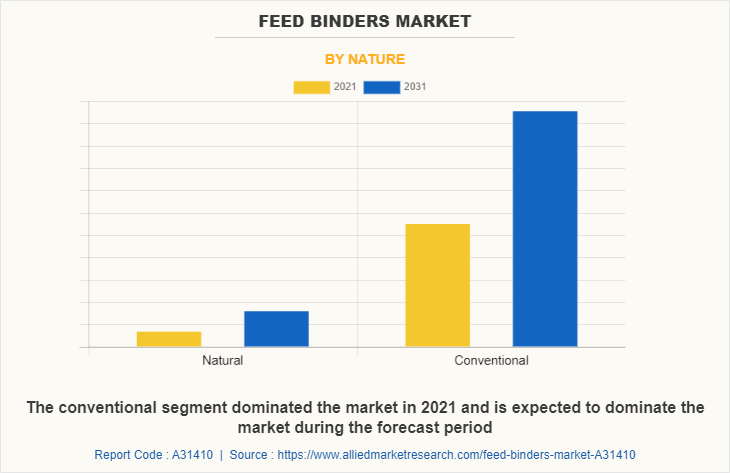
By Type
On the basis of type, calcium lignosulphonate holds the major feed binders market share due to its cheapness and convenience as compared to guar gum and others, so it is affordable for the buyer. Along with this, it can be used as a feed binder for fat-soluble vitamins, carotenoids, and other functional ingredients.
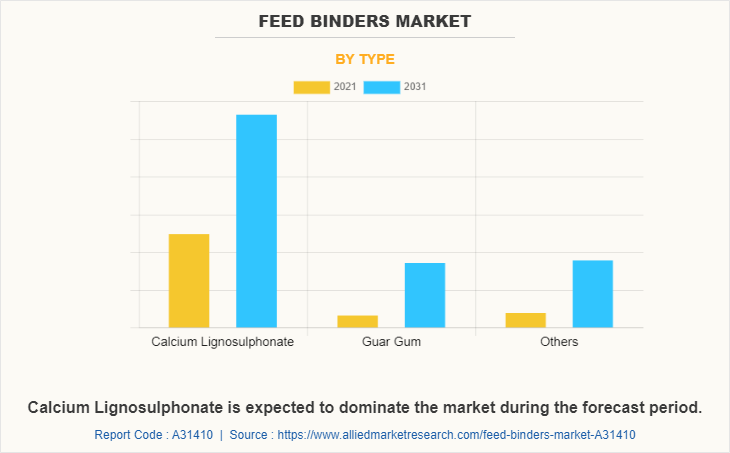
By Animals
As per animals, livestock dominates the market due to the huge demand for meat and dairy products whereas the companion segment is expected to witness the highest growth among the two owing to an increase in pet adoption rate and rising pet humanization rate.
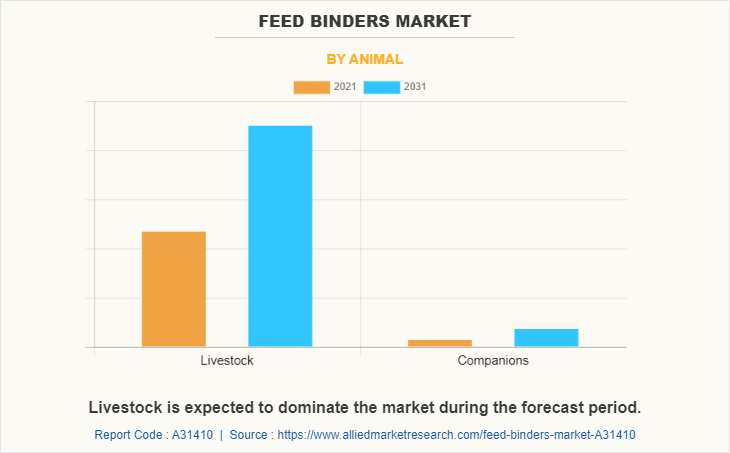
By Region
By region, it is analyzed across North America (the U.S., Canada, and Mexico), Europe (UK, Germany, France, Italy, Spain, and the rest of Europe), Asia-Pacific (China, Japan, India, Australia, Indonesia, and the rest of Asia-Pacific), and LAMEA (Brazil, Argentina, Saudi Arabia, South Africa, and rest of LAMEA).
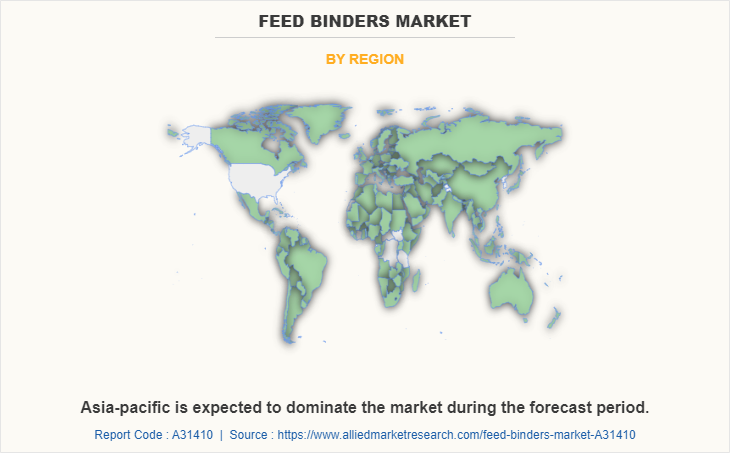
Competitive Analysis
The key players operating in the global feed binders market are analyzed in this report including AF Suter, Allwyn Chem Industries, Archer-Daniels-Midland Company, AVEBE, BASF SE, BENEO GmbH, Bentoli, Borregaard AS, Chemorse, CP Kelco U.S., Inc., Darling Ingredients Inc., Dupont, Emsland Group, Gelita AG, IRO Alginate Industry Co., Ltd., Kemin Industries, Inc., Natural Remedies, Roquette Freres, Uniscope, Inc, and Visco Starch.
Key Benefits For Stakeholders
- This report provides a quantitative analysis of the market segments, current trends, estimations, and dynamics of the feed binders market analysis from 2021 to 2031 to identify the prevailing feed binders market opportunities.
- The market research is offered along with information related to key drivers, restraints, and opportunities.
- Porter's five forces analysis highlights the potency of buyers and suppliers to enable stakeholders to make profit-oriented business decisions and strengthen their supplier-buyer network.
- In-depth analysis of the feed binders market segmentation assists to determine the prevailing market opportunities.
- Major countries in each region are mapped according to their revenue contribution to the global market.
- Market player positioning facilitates benchmarking and provides a clear understanding of the present position of the market players.
- The report includes the analysis of the regional as well as global feed binders market trends, key players, market segments, application areas, and market growth strategies.
Feed Binders Market Report Highlights
| Aspects | Details |
| Market Size By 2031 | USD 2.4 billion |
| Growth Rate | CAGR of 7.1% |
| Forecast period | 2021 - 2031 |
| Report Pages | 246 |
| By Animal |
|
| By Nature |
|
| By Type |
|
| By Region |
|
| Key Market Players | BASF SE, Avebe, AF Suter, Uniscope, Inc., IRO Alginate Industry Co., Ltd., Archer Daniels Midland Company, E. I. du Pont de Nemours and Company, ALLWYN CHEM INDUSTRIES, Visco Starch, Bentoli, Natural Remedies, Kemin Industries, Inc., Emsland Group, BENEO, Borregaard AS, Roquette Freres, GELITA AG, Chemorse, CP Kelco U.S., Inc, Darling Ingredients |
Analyst Review
According to the CXO, the factors such as increase in meat consumption & production and standardization of meat products, owing to disease outbreaks drive the demand for feed binders. However, rise in raw material cost and stringent regulatory structure & intervention are expected to hamper the market growth during the forecast period.
CXO’s further added that the rise in the pet adoption rate coupled with rising pet humanization rate will propel the growth of the market and subsidies provided by government of developing nations such as India on export of meat will motivate the meat manufacturer to increase the meat production. All these factors together are expected to boost the market growth.
Conversely, increase in R&D activities in the field of animal feed binders market is expected to provide substantial growth opportunity for the industry players in the near future.
The global feed binders market was valued at $1.2 billion in 2021 and is projected to reach $2.4 billion by 2031
The global Feed Binders market is projected to grow at a compound annual growth rate of 7.1% from 2022 to 2031 $2.4 billion by 2031
The key players operating in the global feed binders market are analyzed in this report including AF Suter, Allwyn Chem Industries, Archer-Daniels-Midland Company, AVEBE, BASF SE, BENEO GmbH, Bentoli, Borregaard AS, Chemorse, CP Kelco U.S., Inc., Darling Ingredients Inc., Dupont, Emsland Group, Gelita AG, IRO Alginate Industry Co., Ltd., Kemin Industries, Inc., Natural Remedies, Roquette Freres, Uniscope, Inc, and Visco Starch.
Based on region, the market in Asia-Pacific was the largest in 2021
An increase in global meat consumption Industrialization of meat products Rise in awareness of the quality of dairy & meat products Surge in pet humanization rate Economic growth, changes in lifestyle, population growth, and other structural changes
Loading Table Of Content...
Loading Research Methodology...


